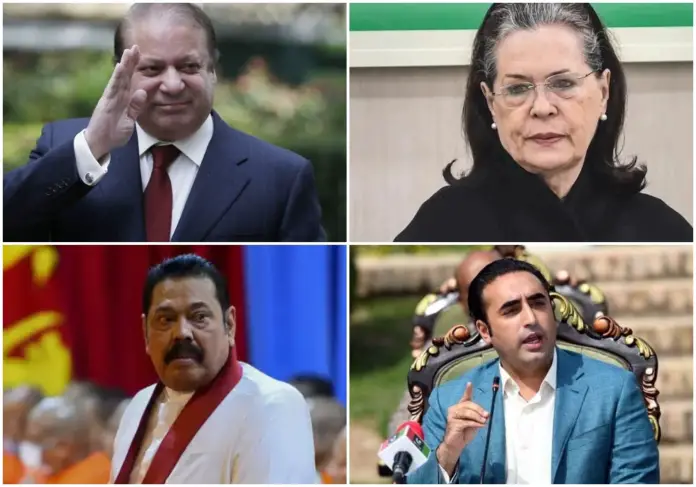Indian Prime Minister Narendra Modi’s take on dynastic politics is worth a thought, being head of the biggest working democracy of South Asia. He states, “In a democracy, dynastic politics is wrong. We need to free the state and nation from it.” An overture probably for his domestic anti-Congress audience, but in essence, making sense. Dynastic politics, can be best described as a sequence of elected public office holders belonging to the same family or lineage. Overview of the same in South Asia, shall enable us to discern effects on societies in this part of the world. Even India, the largest and stable of all the South Asian democracies, has a dynastic hue to its politics. Nehru-Gandhis’ Indian National Congress, which has been calling the shots of Indian politics in the past, has always been in effect a family party, providing for three prime ministers to India, namely, Nehru, Indra and Rajiv.
Notwithstanding, Sonia Gandhi who is presiding the party for the last twenty-two years with the only break from 2017-2019, and not to mention her son Rahul Gandhi, waiting in the wings. Other political parties like Mamata Banerjee’s All India Trinamool Congress and Arvind Kejriwal’s Aam Aadmi Party have now provisioned its office bearers to hold and contest offices as long as they desire, paving way for dynastic politics.
“Battling Begums” of Bangladesh, a famous phrase was coined by “The Economist” for Begum Hasina Wajed (daughter of Sheikh Mujib-ur-Rehman) and Begum Khaleda Zia (widow of Gen Zia-ur-Rehman) casting light on the fact that Bangladesh’s politics is rooted in dynastic enmities, genesis of which is well-known. The matriarchs have been exchanging blows, ever since, in essence landing them on the face of country’s political economy. Hasina Wajid installed her uncle, Zill-ur-Rehman as president of Bangladesh in 2009, the post he held till his death in 2013. Her cousins and nephew are members of the parliament.
Hasina’s son Sajeeb Ahmed Joy is one of her advisers. Similarly, Khaleda Zia established the ‘Zia dynasty’ once she took over as president of the Bangladesh Nationalist Party in 1984. Her brother and sister remained influential in the party. Her son Tarique Rehman was nominated as senior vice president of the party in 2009.
The island nation of Sri Lanka went into anarchy at the heels of an economic meltdown recently. Mob violence has erupted and is claiming lives and damages to public property. For sure, it did not happen overnight. The prevailing situation in Sri Lanka is being attributed to the people at the helm and at helm has been the Rajapaksa family of Sri Lankan politics. At 74, Mahinda Rajapaksa is considered the ‘patriarch’ of Rajapaksa dynasty. He has served as prime minister in 2004 and then as president from 2005 to 2015. He lost public support and thus elections owing to his alleged corruption, authoritarianism and being nepotistic.
His brother, Gotabaya Rajapaksa, three years younger to him, contested presidential elections in 2019 and won. He appointed Mahinda as the prime minister for the second time in 2019. Another Rajapaksa, Basil, 69, nicknamed ‘Mr Ten Percent’, based on the alleged figures of his cut in every contract was made to run the economy of the country. Chamal Rajapaksa was installed as speaker of the parliament. Mahinda’s son Namal Rajapaksa was given the sports ministry.
Now, just a passing reference on our very own Pakistan, whose pendulum has been swinging between the politics of two dynasties i.e. Bhuttos and Sharifs.
The difference in their political thought aside, they both conflate owing to dynastic hold at the intra-party and national levels. The Bhutto dynasty evolved through, Benazir Bhutto, Asif Ali Zardari and lately Bilawal Bhutto Zardari. Similarly, the House of Sharif has also commissioned its second generation into politics.
The same holds good for parties like PML-Q, ANP and JUI-F. In addition to direct blood relations, there is a chain of linkages between political elite through intermarriages. Despite the fact that dynastic politics is the antithesis of democracy, is inherently monopolistic in nature and at tangent to the spirit of democracy itself, yet multiple family members in elective offices seem to be common today, especially in South Asian democracies. The phenomenon is attributable to the very nature of societies of this region, which I described as civic culture, in my last column titled ‘dynamics of regime change‘. The mindsets have remained pinned to their colonial past, making them all the more a breeding ground for dynastic politics. Why this irritation with dynastic politics?
The answer lies in the increased likely-hood of a dynastic politician-cum-legislator, to be influenced by two opposing incentives, one, the drive to build a brand name in politics for public appeal and two, getting lured into stockpiling wealth. Former seems more benign, whereas the latter raises a red flag for good governance and transparency which are basic for a delivering democracy. The brand name building incentive may also lead up to transformation of a political leader into the one leading a cult. As cults operate on blind following and no questioning, therefore, with it, goes the sense of being accountable to the people being led and freedom of expression; proving more dangerous than the second incentive.
Consequent to dynastic politics of South Asia, are the social ills of intolerance, lack of merit, discrimination, rampant corruption, nepotism and authoritarian mindsets of dynastic rulers. Last but not the least is the critical dearth of second tier or alternate leadership which is not allowed to take root and hence the power musical chairs between the limited available options. What more or what next for us in Pakistan? Some law, enacting some bars, may be?







